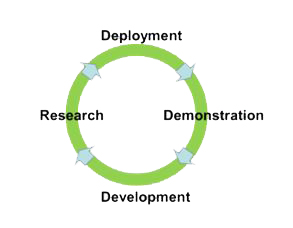About CRSGI
CRSGI is one of the ten Global Innovation Initiatives funded by the United States Department of State, Bureau of Educational and Cultural Affairs started in 2014. Learn more about its objective, visions and goals.
- To establish a research framework to realize the smart grid benefits in every segment of participating countries regardless of their economic status.
- To establish a research framework based on RDD&D (Research, Development, Demonstrate, and Deployment) approach to gain the maximum impact to the societies.
- To promote energy efficiency, energy independency, and renewable energy integration.
- To increase the access to energy through sustainable economic gains.

- To establish a research framework to realize the smart grid benefits in every segment of participating countries regardless of their economic status.
- Applying a cyclical RDD&D (Research, Development, Demonstrate, and Deployment) approach to gain the maximum impact to the societies.
1. Development
- Technology Assessment
- Survey Instrument Development
- Simulation Tool Development
2. Research
- Power System Research
- Feedback Research Design
- Consumer Behavior Research
- Case Studies
3. Deployment
- Demographics
- Consumer Behavior
- Existing Infrastructure
- Scalability
- Impact to the Society
4. Demonstration
- Pilot Project
- Process (Energy) Audits
- Technology Integration
- Feedback Tool Effectiveness
- Simulation Tool Effectiveness
- Reduce electric demand and consumption rural electric communities through research and education.
- Increase power quality the power grid of a rural electric community when distributed energy generation is introduced though engineering analysis.
- Introduce effective feedback methodologies to change consumer behaviors related to electrical energy consumption.
- Investigate all possible scenarios for rural communities to become energy independent.
- Establish continuing research activities where faculty, students, and industry personnel will participate in continuous improvement though exchange programs, applied research, and symposiums.
Outcomes
- Outcomes of goals related to reduced demand and power quality improvement.
- Tutorial conducting and energy audits
- Energy management training material
- Consumer surveys
- Load profile identification and change methods
- Peak shaving techniques
- Pricing options
- Agent based modeling
- Community engagement
- Wiring practice assessments
- Voltage sag and swell studies
- Volt/var control
- Power factory simulations for power-quality identification
- Renewable energy sizing
- Renewable energy integration options simulation
- Apply advanced meter infrastructure for power quality
2. Outcomes of goals related to feedback method development.
- Consumer surveys
- Consumer behavior identification
- Appliance level load detection
- Effective feedback methods design
- Agent based modeling
3. Outcome of goals related to energy independence and research engagement.
- Microgrids possibilities
- Economic analysis for energy cooperatives
- Agent based modeling
- Community engagement
- PowerFactory based simulation construction
- Hybrid grid emulator
- Volt/var control
- Renewable energy integration options simulation
- Commercial advanced meter infrastructure operations
- Agent based modeling for power systems
- Gaming and social media for energy conservation
- Group student activities
Consortium Leadership
The Consortium for Rapid Smart-Grid Impact is under the leadership of Athula Kulatunga, Ph.D., and PNW’s Engineering Technology Department.

Professor, Electrical Engineering Technology
(219) 989-2614
Hammond, Potter 227